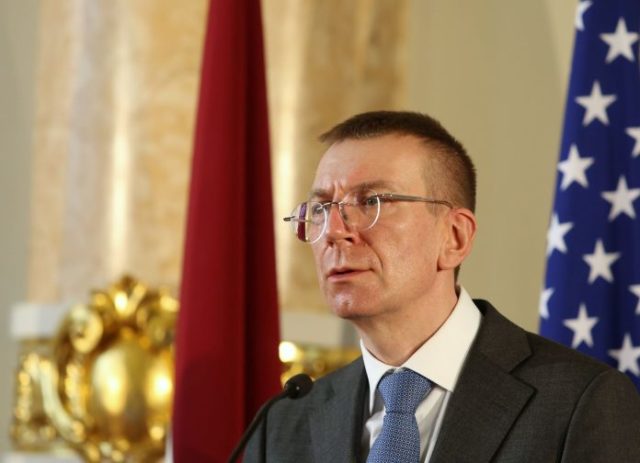
Latvia Contemplates Conscription in Face of Russian Aggression
Publication: Eurasia Daily Monitor Volume: 19 Issue: 117
By:

Focused on substantial reinforcement of self-defense capabilities while the regional security situation deteriorates due to Russia’s re-invasion of Ukraine, Latvia is considering reinstating a policy of compulsory military service, which is officially supported by the governing political parties (Lsm.lv, July 13). Compulsory military service already exists in the other two Baltic states, Estonia and Lithuania. Estonia has continued to maintain compulsory conscription even while developing a professional army.
Currently, Russia’s army has been weakened by devastating offensive setbacks in Ukraine. So much so, that it would not be possible for Russia to engage in another major offensive against any neighboring country for the next two years. As such, according to Latvian Minister of Defense Artis Pabriks, this means that now is the time for Latvia to boost its self-defense capabilities (Leta.lv, July 16).
After many years of hesitation, the minister of defense proposed gradually introducing a compulsory National Defense Service over five years starting in 2023. From January 1, 2023, in the first stage, young men would apply for the service voluntarily. After this five-year transition period, the service will be compulsory for men between the ages of 18 and 27. Plans are underway to conscript into the services Latvian citizens residing overseas, and if adequate funding is allocated, mandatory military service for women as well.. The duration of a National Defense Service term is planned to be at least 11 months (Lsm.lv, July 16). From 2025 to 2026, investments of approximately 60–70 million euros ($61 million–$71.2 million) will be required to implement this renewed conscription policy (Sargs.lv, July 6).
The initiative to reinstate conscription has spurred further discussion in the Latvian parliament, wider government and society writ large. Latvian Minister of Foreign Affairs Edgars Rinkevics believes that the most important aspect for discussing this new policy revolves around the details of implementation, as well as “the questions that still need to be answered.” He continues, “Therefore, it is essential that the National Defense Service not only requires citizens to fulfill their duty but also gives the feeling that the year in the army has been spent meaningfully both for the benefit of the country and for one’s personal growth. Motivation is important” (Nra.lv, July 7).
Currently, approximately 7,000 soldiers make up Latvia’s professional military service. However, to effectively defend Latvia during a direct military attack, 40,000 to 50,000 professionally trained personnel are required. Since February 2022, 3,048 candidates have applied to the Latvian National Guard, and in total, 9,500 people currently serve in this volunteer organization. According to Latvian Ministry of Defense figures, the mandatory National Defense Service from 2027 on will allow for a significant increase in the number of military-trained citizens. Within five years, the number of trained personnel could increase from 20,000 to upward of 50,000 (Lsm.lv, July 8).
The current pace of recruitment in the professional service of the Latvian National Armed Forces emphasizes the need for conscription as soon as possible. As was stressed by the commander of the armed forces, Lieutenant General Leonids Kalnins, 2022 has marked the lowest record of applications for the professional military service, and these figures are alarming for future defense considerations (Delfi, July 7). The spokesman for the Latvian Ministry of Defense, Kaspars Galkins, has declared that the planned mandatory National Defense Service intends to include Latvian citizens living abroad, and the service could be mandatory for women as well, if the necessary funding is acquired (Lsm.lv, July 7).
As Galkins explained, the military service will be considered as a new social contract between the Latvian state and society, which means that every citizen must be engaged in the defense of the country. This policy is one of the most critical efforts for Latvia to implement and support, ensuring that it will be prepared should Russia resort to further military aggression.
Estonian President Toomas Hendriks Ilves has argued that small countries that have relied solely on a voluntary professional army have made the wrong choice. The professional army is suitable for large countries, such as Germany and the United Kingdom, which have no problem recruiting a sufficient number of soldiers. Ilves believes that small countries struggle to recruit necessary numbers and therefore must rely on some level of conscription (TV3.lv, July 6).
By choosing the path of restoring conscription, Latvia would assure its allied partners in the North Atlantic Treaty Organization (NATO) that it will fully comply with Article III of the North Atlantic Treaty—that is, an individual commitment of each NATO member to strengthen its own resilience, which in turn reduces the vulnerability of NATO as a whole. At the same time, this step by the Latvian government further bolsters the credibility of NATO deterrence in the face of the growing Russian threat.



